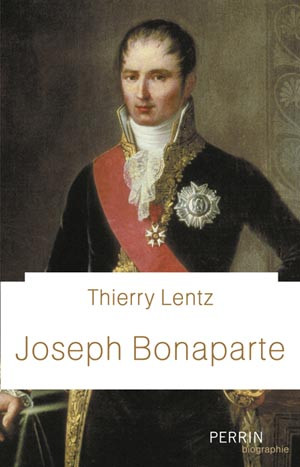In French.
Joseph Bonaparte -the perfect example of the unknown celebrity – steps out of the shadows with this remarkable biography which demonstrates that, in fact, the personality, role and political action of Napoleon’s elder brother ought to have been studied in their own right and not only in comparison with the Emperor. This study is the result of fifteen years of research into the Napoleonic period; it is also based on the Joseph Bonaparte archives which have only fairly recently been made available, in 1979, when they were returned to France by the Wellington family, and which shed a new light on the Spanish question.
Out of this re-establishment of certain historical truths emerges a complex personality and an equally complex relationship between the two elder Bonapartes. Thus, despite the assertion of decidedly different political ideas in the sometimes violent conflicts with Napoleon, especially during discussions on the establishment of the hereditary Empire, Joseph Bonaparte always remained loyal to his brother the Emperor and to the regime. And the place that Napoleon gave to his brother, during the Consulate and the Empire (negotiator of important diplomatic treaties – the Treaty of Mortefontaine with the United States (1800), the Peace of Lunéville with Austria and the Concordat with the Holy See (1801), the Peace of Amiens with England (1802) – King of Naples and Spain, lieutenant general of the Emperor in 1814) also shows that the Emperor could not do without Joseph. That said, this biography also shows how Joseph Bonaparte was an important personality in his own right, before (in Corsica) and after (US and Europe) Napoleon.
(text by I. Delage)
On the Web
Presentation of the book in the Voix de l’histoire (video in French, duration: 31:54).
Editor’s Note
Joseph Bonaparte (1768-1844) played a significant role during the Revolution and in the government of his younger brother, Napoleon. A simple overview of the functions he held during this quarter of a century is enough to measure his importance: President of the district of Ajaccio, Commissaire des Guerres, Ambassador, Député, Conseiller d’Etat, Senator, Grand Elector of the Empire, King of Naples, King of Spain, the Emperor’s Lieutenant General in 1814, Chairman of the Council of Ministers during the Hundred Days. His public political role was extremely prominent, marked as it was by a very special relationship with Napoleon of whom he was perhaps the only friend. After 1815, his position was not secondary either, despite his departure from Europe for a long exile of almost twenty-five years in the United States where he became a prominent character, even in official circles. Furthermore he acted as a kind of courtesy Regent on behalf of the King of Rome and, after the latter’s death (1832), he became pretender to the imperial throne. With age, he became ever more rigid in this respect provoking a certain conflict with his nephew Louis Napoleon, later Napoleon III. He ended his days in Florence where he was buried, in 1844, and in 1862 his mortal remains were transferred to the Invalides in Paris alongside those of his brother, Napoleon.
About the author
Director of the Fondation Napoléon since 2000, Thierry Lentz is the author of numerous books, including Le Grand Consulat 1799-1804 (Fayard, 1999), Nouvelle histoire de l’Empire (Fayard, 2002-2010, 4 volumes), Napoléon diplomate (CNRS éditions, 2012), Le congrès de Vienne. Une refondation de l’Europe (1814-1815) (Perrin, 2013), Les vingt jours de Fontainebleau. La première abdication de Napoléon (Perrin, 2014), Waterloo. 1815 (Perrin, 2015).


